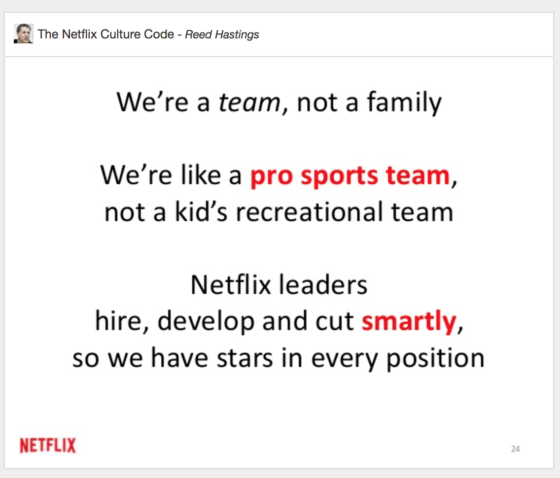There was a time where I wholly embraced calling our team — our company — a family.
I’ve written cards to our community members and called them part of our Buffer family. I’ve sent custom packages to welcome our new teammates to the Buffer family (and we’ve grown from 25 teammates to nearly 90 in about four years.)
I relished how the term “family” made everyone feel so welcomed, accepted, and appreciated. There’s nothing quite like feeling you are a part of a family.
Now, I believe this was misguided and perhaps damaging.
Going forward, I will not refer to my beloved workplace and my incredible, talented, generous teammates as my family.
Here’s why.
“What’s so bad about calling our workplace our family?”

A bit about me: I’m a very family-oriented person (I helped come up with our company family leave policy), and I’m an utter and complete people-pleaser. My number one strength in the Strengths Finder test is Harmony. I live to make those around me happy.
So it may seem a bit out of character to be questioning the term “family.”
In the past year, I’ve taken a role that allowed me to speak more with all of my coworkers, listen to problems, concerns, celebrations, and everything in between. There’s a bit of a thread in many of these conversations, and it’s a signal I see pop up again and again.
It pains me to even write this when it eschews the traditional wisdom and trend of modern workplaces, but I know it to be true:
There’s a place for work, a place for family.
Work is not your family.
We need to stop calling it such.
Work doesn’t have to be a place you hate, of course. And family doesn’t have to be the only time where you can be your true and authentic self.
It’s when the lines blur that things get a little uneasy (on both sides).
This excellent New York Times interview with author Alison Green articulates things perfectly:
Tim Herrera, New York Times: What’s so bad about calling our workplace our family?
Alison Green: Work can definitely be a place where you have warm, supportive relationships with your co-workers and genuinely care about each other, but they’re not families. That might sound like semantics, but, “We’re like a family here” tends to be used in ways that really disadvantage workers…
TH: So it can sometimes be code for, “We expect to be the top priority in your life”?
AG: A lot of times, yes. Or it means, “We expect you to be loyal to us even though we won’t necessarily return that loyalty when the chips are down.” Or, “We’re going to lean on you to work long hours, accept lower pay and not complain about bad management because, hey, ‘We’re family,’ and asking for a raise or flex time will mean you’re not a team player.”
Inclusivity and belonging are a part of our core values at Buffer— and being a part of a family relates to the very deepest nature of feeling included and a part of something.
But as this writer asks,
Leaving or abandoning your family is one of the worst things you can do. So what impact does this have when your workplace begins to adopt this “family” mentality?
Problem #1: You can’t fire your family
So what happens when a company parts ways with a teammate or a teammate moves on to a new opportunity?
You’re not supposed to “quit” a family.
Family members don’t “fire” one another.
Because we’ve referred to ourselves as a family, when people leave Buffer, there’s been an underlying thread of unease and a sense of secret whispers that float about. This happens despite being a 100% remote team spread across the globe and sharing as much context about the decision as is appropriate.
But we’re not a family.
We’re a business with customers to serve and with teammates who have bills to pay and actual families to look after.
To serve their families and pursue their career (in a way Buffer might not be able to provide) might mean leaving this business for a new one. There should be no hard feelings, no tethering obligation, no sense of deep, icky guilt that comes when we tie ourselves together as family.
When we have to make the hard call to let someone go, it can almost feel like a betrayal. You don’t fire family. But sometimes, things don’t work out, and people don’t thrive in our unique environment. In the end, it is almost always better for everyone.
While families might have to give “tough love” at times in the form of discussions or advice, it’s not at all like work conversations. At work you have a series of positive and constructive feedback exchanged, performance reviews conducted, production goals and other expectations held accountable.
When it comes to these hard conversations and tough decisions at work, the concept of “family” makes everything more complicated.
Moreso, the reality for some is that family isn’t a safe or accepting place, either. Calling your team a “family” may not engender happy feelings for everyone. All in all — family is just not the right term to describe your place of work.
Problem #2: Blurring the lines between work family & actual family
Being able to clock out and literally walk out of the traditional brick-and-mortar office is a hidden luxury that most work-from-home employees don’t have.
While some of our teammates opt to work from coworking spaces or coffee shops (and Buffer as a company helps encourage this with coworking stipends), about 80 percent of our team still works from their homes.
This offers immense benefits — no commuting, fewer costs from eating out, being closer to your family (and furry friends) all day long, and so much more.
However, this can lead to unclear lines of where your workspace ends and family space begins. It makes it difficult to truly “walk away” from the office. It makes it hard to delineate between family time and work time.
We don’t want this type of angst for our teammates. We want our teammates to disconnect fully when they’re not working, and live their fullest life both in their work and outside the virtual office.
Problem #3: Ranking your “families”
Of course, it’s hard to leave the office sometimes when work is, well, fun. And fun is a great thing for our workplace to be able to boast (though we still have challenges at times like every company). However, this can lead to overwork — and we as a company don’t want to steal time from the life you lead beyond our digital walls.
So it’s natural to enjoy hanging out online with your coworkers. — and our foundation of a values alignment means we all feel bonded rather quickly. And we put an emphasis on spending time to get to know each other more. When we know each other and trust each other, we’re able to collaborate better and ship things faster.
I never want teammates’ families to feel left behind or “second” to Buffer — but I’ve seen it happen. I admire and greatly value our team’s devotion; we work hard to repay it in kind through thoughtful benefits and fair compensation. But no manner of benefit or compensation is trade for time taken from family. I believe the kindest thing we can do, is help our teammates draw firm, clear boundaries.
Drawing Healthy Boundaries
While it might feel contrary, the healthiest relationships thrive with the clearest of boundaries.
Healthy boundaries in a workplace create:
- Clearer accountability and assumptions
- Space for creativity, honesty and transparency
- Establish shared norms and behaviors to better work together
Our core values, in essence, help set boundaries and provide a rubric for tough decision making along with guiding day-to-day interactions. Job descriptions help set boundaries for responsibilities. Additional boundaries may come in the form of policies and procedures.
It’s not as though boundaries can never change or adapt, but defining them allows for the starting point of healthy relationships and well-communicated expectations.
Some teammates shared suggestions to better create boundaries between home and work:
- Use different browsers for work or home.
- Better yet, use different profiles on your computer so certain apps are not available to you during non-work hours.
- Completely shut down your laptop in the evening so you’re not tempted to log in and check one more thing. (New York City Council is testing an approach where workers have a “right to disconnect.”)
- Set clear schedules with your family members so they know your office hours. (Many even recommend not taking outside phone calls or running personal errands during those office hours.)
- Put your cell phone on the other side of the room while with family to minimize the desire to check notifications or emails.
Companies can embrace a healthy way of encouraging work-life symbiosis.
How can we describe this bond and relationship we are striving for? Reed Hastings of Netflix approaches it this way:

I also love this message from Pinay’s CEO about choosing family over the company’s needs.
“They are your home first before the company gave you a second home, they’re your family before you became mine.”
In Closing
At Buffer, we have a special relationship founded in shared values and a commitment to our product, customers, and teammates. We value bringing your authentic self to work and believe it makes us a stronger team and more fulfilled as individuals. This means we are vulnerable and honest and open with each other — and it’s not to say friendships won’t develop or that they shouldn’t.
I think we can feel closer than family at times. And that’s wonderful.
But. At the end of the day, we are a business and we pay people for their services to build our product, care for our customers and look after the team itself. I believe this allows each person we hire to build the lives they want, care for their families, and cultivate the passions in themselves.
We are not a family. The term for what we are and strive to be simply might not exist (yet.) We are a company who cares and strives to work together in the healthiest way possible. We want to challenge the status quo of what it means to “work,” but rather love what you do and love your life outside of your work even more.
Removing the notion of us as a “family” doesn’t diminish the power of our close bonds and the fact that we all love working here. On the contrary, I believe Buffer as a company will continually strive to make this fact even stronger.
What do you think?
Does this topic bring any feelings (good or bad) up in you? I’d love to learn more in the comments!
Try Buffer for free
190,000+ creators, small businesses, and marketers use Buffer to grow their audiences every month.




